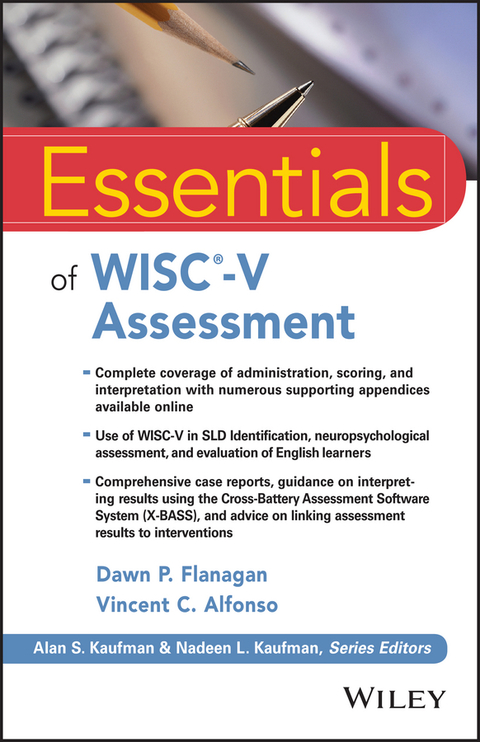Description
Efnisyfirlit
- Cover
- Title Page
- Copyright
- Dedication
- Acknowledgments
- Series Preface
- Foreword
- References
- Chapter One: Overview of the WISC-V
- From Prediction to Prevention
- From Explanation to Enduring Empathy
- General Trends in Intelligence Test Interpretation
- Why the History of the Wechsler Scales Matters
- Description of the WISC-V
- Rapid Reference 1.1
- Rapid Reference 1.2
- Rapid Reference 1.3
- Rapid Reference 1.4
- Rapid Reference 1.5
- Rapid Reference 1.6
- Rapid Reference 1.7
- Rapid Reference 1.8
- References
- Chapter Two: How to Administer the WISC-V
- Appropriate Testing Conditions
- Rapport With Examinee
- Rapid Reference 2.1
- Rapid Reference 2.2
- Rapid Reference 2.3
- Rapid Reference 2.4
- Testing Individuals With Special Needs
- Administration Considerations
- Rules for Starting and Discontinuing Subtests
- Rapid Reference 2.5
- Recording Responses
- Rapid Reference 2.6
- Timing
- Rapid Reference 2.7
- Querying
- Repeating Items
- Subtest-by-Subtest Rules of Administration of the WISC-V Primary Subtests
- Subtest-by-Subtest Rules of Administration of the WISC-V Secondary and Complementary Subtests
- Frequently Asked Questions: Subtest Administration
- Rapid Reference 2.8
- References
- Chapter Three: How to Score the WISC-V
- Types of Scores
- Rapid Reference 3.1
- Step by Step: How the WISC-V is Scored
- Rapid Reference 3.2
- References
- Chapter Four: How to Interpret the WISC-V
- Rapid Reference 4.1
- Getting Started
- Rapid Reference 4.2
- Rapid Reference 4.3
- Rapid Reference 4.4
- Rapid Reference 4.5
- Rapid Reference 4.6
- Rapid Reference 4.7
- WISC-V Interpretation Step by Step
- Rapid Reference 4.8
- Rapid Reference 4.9
- Rapid Reference 4.10
- Rapid Reference 4.11
- Rapid Reference 4.12
- Rapid Reference 4.13
- Rapid Reference 4.14
- Rapid Reference 4.15
- Rapid Reference 4.16
- Rapid Reference 4.17
- Rapid Reference 4.18
- Rapid Reference 4.19
- Rapid Reference 4.20
- Rapid Reference 4.21
- Rapid Reference 4.22
- Rapid Reference 4.23
- Rapid Reference 4.24
- Rapid Reference 4.25
- Rapid Reference 4.26
- Rapid Reference 4.27
- Rapid Reference 4.28
- Rapid Reference 4.29
- Rapid Reference 4.30
- Rapid Reference 4.31
- Rapid Reference 4.32
- Rapid Reference 4.33
- Rapid Reference 4.34
- Rapid Reference 4.35
- Conclusion
- References
- Chapter Five: Strengths And Weaknesses of the WISC-V
- Rapid Reference 5.1
- Rapid Reference 5.2
- Rapid Reference 5.3
- Rapid Reference 5.4
- References
- Chapter Six: A Neuropsychological Approach to Interpretation of the WISC-V
- Levels of Interpretation
- Rapid Reference 6.1
- Rapid Reference 6.2
- Rapid Reference 6.3
- Rapid Reference 6.4
- Rapid Reference 6.5
- Neuropsychological Interpretation of WISC-V Performance
- Rapid Reference 6.6
- Rapid Reference 6.7
- Rapid Reference 6.8
- Rapid Reference 6.9
- WISC-V Complementary Subtests
- Rapid Reference 6.10
- Conclusion
- References
- Appendix 6.A: Cognitive Constructs Assessed with the WISC-V Subtests
- Cognitive Constructs Assessed With the Fluid Reasoning and Visual Spatial Subtests
- Cognitive Constructs Assessed With the Working Memory Subtests and the Arithmetic and Immediate Symbol Translation Subtests
- Cognitive Constructs Assessed With the Processing Speed Subtests
- Cognitive Constructs Assessed With the Naming Speed Subtests
- Cognitive Constructs Assessed With the Symbol Translation Tasks
- Appendix 6.B: Behavior Observations and Process-Oriented Assessment at the Subtest, Item, and Cognitive Construct Levels
- Verbal Comprehension Subtests
- Fluid Reasoning and Visual Spatial Subtests
- Working Memory Domain and Arithmetic and Symbol Translation Subtests
- Processing Speed Subtests
- Naming Speed Subtests
- appendix 6.C: Cluster Analysis Interpretation
- Steps for Completing Subtest Cluster Analyses
- Verbal Comprehension Clinical Clusters and Cluster Contrasts
- Fluid Reasoning and Visual Spatial Clinical Clusters and Cluster Contrasts
- Working Memory Clinical Clusters and Clinical Cluster Contrasts
- Appendix 6.D: Subtest and Process Score Comparison Worksheets
- Chapter Seven: Use of the WISC-V in the Identification of Specific Learning Disabilities
- The Dual Discrepancy/Consistency Operational Definition of SLD
- Rapid Reference 7.1
- Rapid Reference 7.2
- Rapid Reference 7.3
- Rapid Reference 7.4
- Rapid Reference 7.5
- Rapid Reference 7.6.
- Rapid Reference 7.7
- Rapid Reference 7.8
- Rapid Reference 7.9
- Rapid Reference 7.10
- Using X-BASS for SLD Identification: Three Steps to PSW Output
- Rapid Reference 7.11
- PSW-A Data Summary
- PSW-A g-Value Data Summary
- Dual Discrepancy/Consistency Model: PSW Analyses for SLD
- Conclusion
- References
- Appendix 7.A: Factors That May Facilitate Learning and Aid in ByPassing or Minimizing the Effects of Deficits
- References
- Chapter Eight: Illustrative Case Report
- Psychoeducational Evaluation Report
- Reference
- Appendix 8.A: CBRS Scores
- Appendix 8.B: Cross-Battery Assessment Software System (X-BASS): Dual-Discrepancy/Consistency Model: PSW Results for AMANDA FARRIS
- Chapter Nine: Assessment of English Learners With the WISC-V
- Fairness, Bias, and Traditional Assessment Approaches
- A Recommended Best Practice Approach
- Best Practices in the Evaluation of ELs With the WISC-V
- Case Study: Jose Maria
- Conclusion
- References
- Chapter Ten: WISC-V and Q-interactive
- Digital Platform
- Rapid Reference 10.1
- Hardware
- Software
- Set-Up
- Rapid Reference 10.2
- Administration
- Rapid Reference 10.3
- Training and Tech Support
- Output
- Security and Legal Issues
- Considerations for University Trainers
- Rapid Reference 10.4
- Overall Impressions and Recommendations
- References
- Epilogue: Dorothea McCarthy Remembered
- References
- About the Authors
- Contributors
- Index
- End User License Agreement






Reviews
There are no reviews yet.